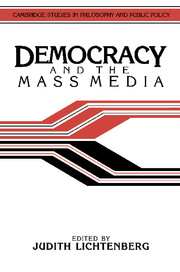Book contents
- Frontmatter
- Contents
- Preface
- List of contributors
- Introduction
- 1 Liberal constraints on private power?: reflections on the origins and rationale of access regulation
- 2 Liberalism and free speech
- 3 Foundations and limits of freedom of the press
- 4 Why the state?
- 5 Practices of toleration
- 6 Access in a post–social responsibility age
- 7 Who decides?
- 8 Four criticisms of press ethics
- 9 Political communication systems and democratic values
- 10 Mass communications policy: where we are and where we should be going
- 11 Content regulation reconsidered
- 12 The rationale of public regulation of the media
- 13 The role of a free press in strengthening democracy
- Index
4 - Why the state?
Published online by Cambridge University Press: 05 June 2012
- Frontmatter
- Contents
- Preface
- List of contributors
- Introduction
- 1 Liberal constraints on private power?: reflections on the origins and rationale of access regulation
- 2 Liberalism and free speech
- 3 Foundations and limits of freedom of the press
- 4 Why the state?
- 5 Practices of toleration
- 6 Access in a post–social responsibility age
- 7 Who decides?
- 8 Four criticisms of press ethics
- 9 Political communication systems and democratic values
- 10 Mass communications policy: where we are and where we should be going
- 11 Content regulation reconsidered
- 12 The rationale of public regulation of the media
- 13 The role of a free press in strengthening democracy
- Index
Summary
Americans are distrustful of the state. There have been occasional reversals of this attitude, for example, during the two world wars, the New Deal, and the civil rights era. But for the most part we have looked upon the state with great distrust, and for almost two decades now an attack on “big government” has been the organizing principle of American politics. It has provided the energy behind the demand for “deregulation,” “privatization,” a “balanced budget,” and the “new federalism.” No one has been more successful in conducting this war on the activist state than Ronald Reagan, and for this purpose he drew upon the classical liberal tradition of the United States.
For many, the First Amendment is seen as the apotheosis of this tradition. It is read as a bar to state action and given an almost absolutist quality. Exceptions are now and then permitted, when the stakes get high enough and urgent enough, as in the case of national security, but at its core the amendment is generally read as creating a strong presumption against state interferences with almost any form of speech. This reading of the First Amendment has been sustained and nurtured by the more general distrust of the state that is associated with classical liberalism and that was given such forceful expression by the Reagan administration. The amendment has returned the favor and has served as an important breeding ground of libertarian sentiment. Indeed, advocates of economic laissez-faire have often used the First Amendment to remind New Deal liberals of the virtues of limited government.
- Type
- Chapter
- Information
- Democracy and the Mass MediaA Collection of Essays, pp. 136 - 154Publisher: Cambridge University PressPrint publication year: 1990
- 7
- Cited by

